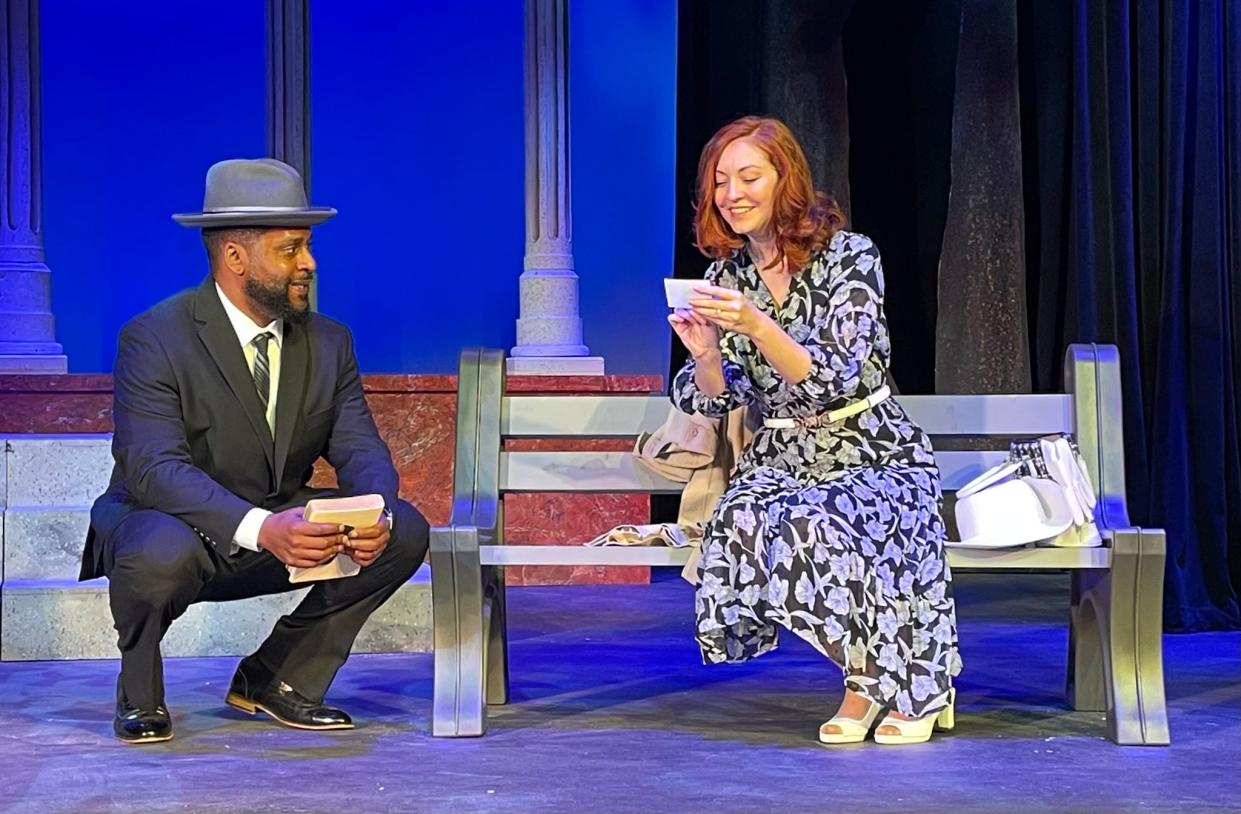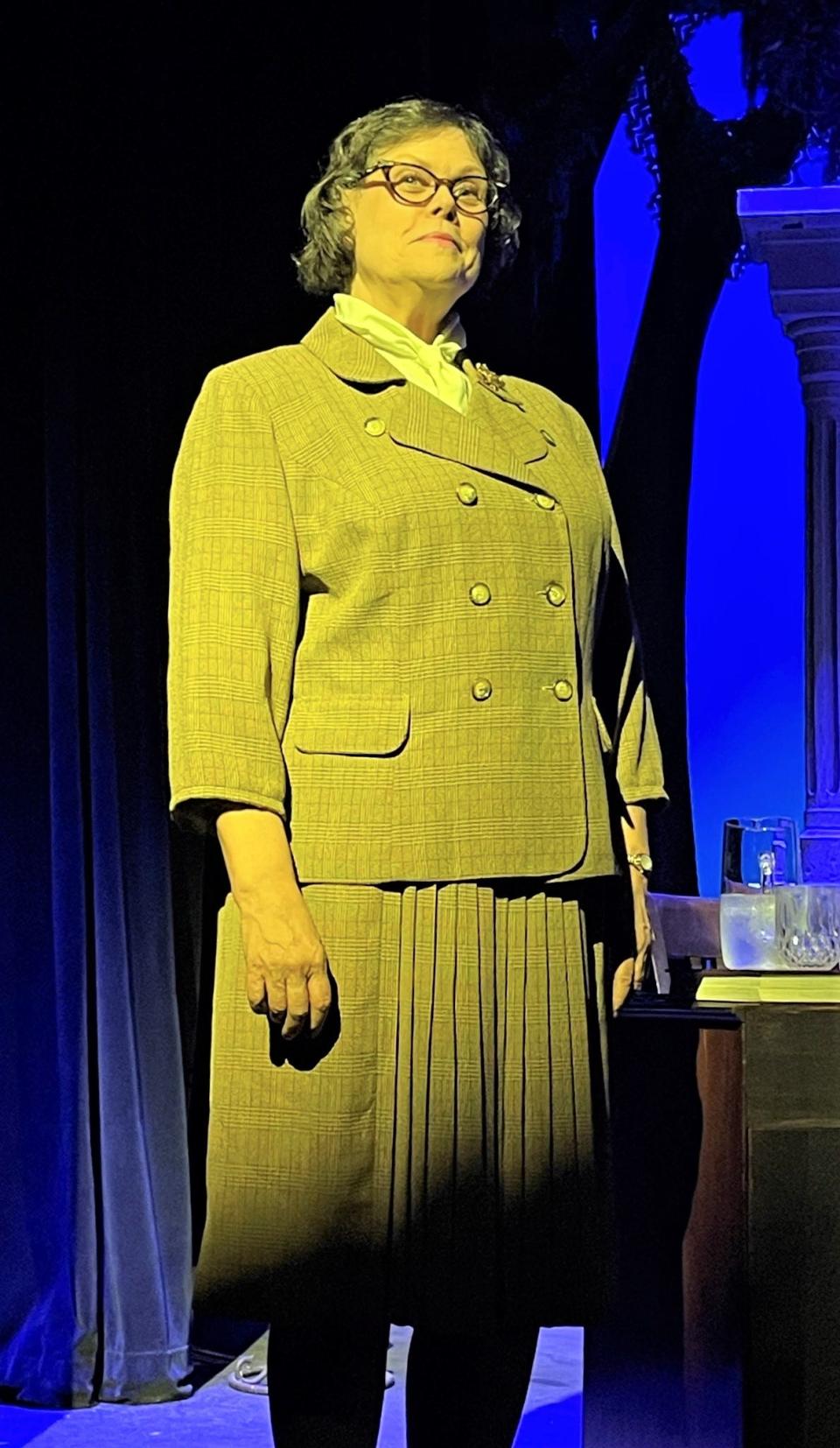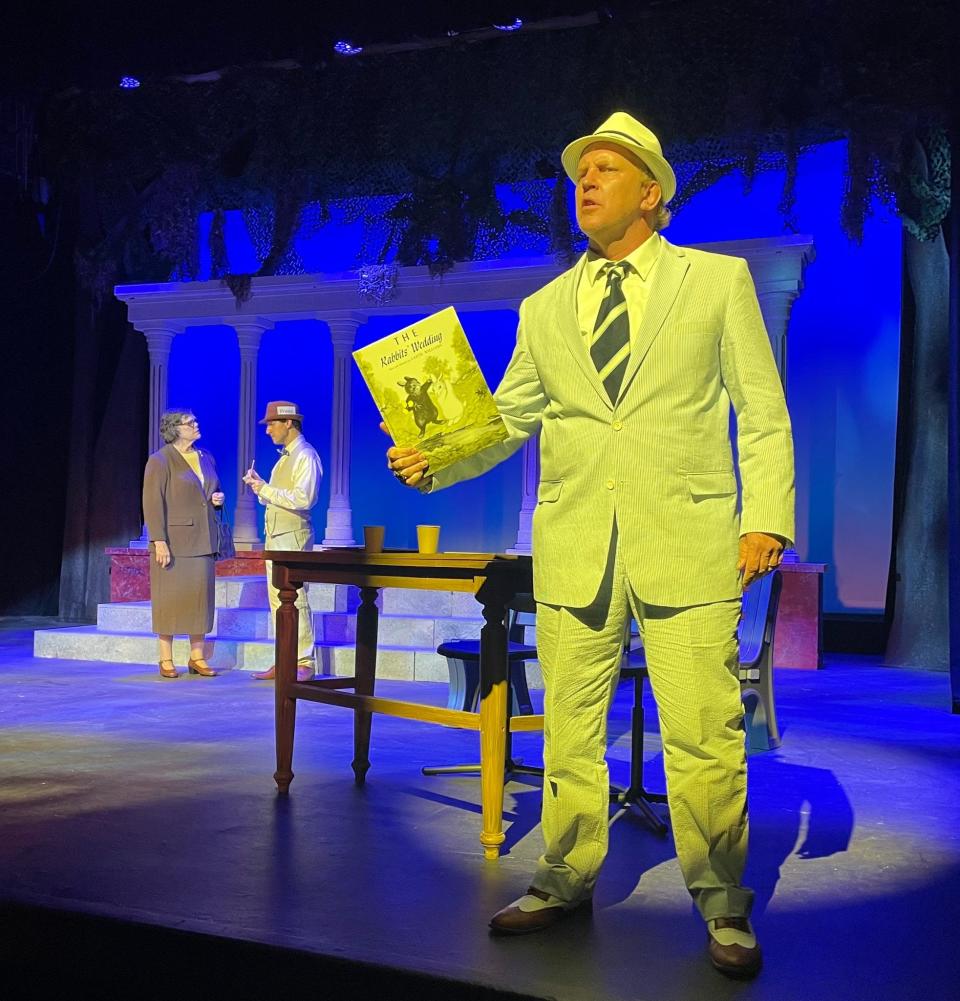Mark Woods: At Theatre Jacksonville, timely retelling of a story about 1959 book battle

“This is a story about two rabbits.”
So begins “Alabama Story,” a play being performed this month at Theatre Jacksonville in San Marco.
In the opening scene, the characters tell you that this is a story about much more than two rabbits, one black and one white, in a 1958 children's book, “The Rabbits’ Wedding.”
It’s a story about how that book ended up in the middle of 1950s culture wars; with some in Alabama saying it was indoctrinating children by pushing a pro-integration agenda; with a state senator calling for the book to be banned and burned, and the state's head librarian to be removed from her position; and with that librarian standing up for more than this one book.
“This is about books,” she says, “many books.”
The script has the characters tell audiences that what they’re about to hear is a children’s story, a love story, an Alabama story, a story within a story, and — somewhere between the lines — a true story.
What it doesn’t say — what it doesn’t have to say — is that it’s not just a story about the 1950s, Alabama and two rabbits.
'We have to do this play'
Sarah Boone, executive director of Theatre Jacksonville, grew up with “The Rabbits’ Wedding” in her house.
The illustrator, Garth Williams, was best known for his artwork for “Charlotte’s Web,” “Stuart Little” and “Little House on the Prairie.” For this book, he made one rabbit black and one white for a practical reason. He wanted kids to be able to tell the rabbits apart. So he made the male rabbit black and the female one white.
It wasn’t a statement about integration or interracial marriage — until some in Alabama, led by one prominent politician, made it one.
Not that Boone knew any of this when she was growing up. She hadn’t even thought about the book for decades, until she was in a New York drama bookstore, checking out some of the new plays, thinking about Theatre Jacksonville's next season. “Alabama Story” was first produced nearly a decade ago, but wasn’t published and widely available until 2022.
“I read it and I just thought it was so timely,” Boone said.

She also thought something about the story sounded familiar. It wasn’t until she pulled up the cover of “The Rabbits’ Wedding" that she realized why. She remembered it from her childhood, simply as a sweet story about two rabbits who wanted to be together forever.
When she brought the “Alabama Story” script back to Florida, members of the Theatre Jacksonville repertory committee and board also read it.
“Everybody said, ‘We have to do this play,’” she said.
Every year, when the Theatre Jacksonville is putting together the next season, they include at least one show about an issue. The goal is to have theater do what maybe other venues, like social media, often fail to do: start a thoughtful conversation.
For Theatre Jacksonville's 104th season, "Alabama Story" seemed remarkably fitting.
An ode to books and librarians
Boone ended up having a long conversation over coffee with Kenneth Jones, the playwright of “Alabama Story.”
When Jones explains the origin of his play, he points to reading the obituary pages of the New York Times one day in 2000, seeing a story about a librarian.
Emily W. Reed, who in 1959 enraged Alabama segregationists by allowing a book about a fuzzy white rabbit marrying a fuzzy black rabbit onto the shelves of the state's central library, died on May 19 at a retirement community in Cockeysville, Md. She was 89.
The confrontation came as blacks were fighting to be allowed in public libraries throughout the South and a segregationist in Florida was demanding that ''The Three Little Pigs'' be removed from library shelves because the pigs were depicted in different colors. … In Ms. Reed's case, the book in question was ''The Rabbits' Wedding.''
Reed grew up in Culver, Indiana, graduated from the University of Michigan and worked at numerous public and academic libraries (including Florida State) before becoming Alabama’s library director. In that role, she was responsible for the selection and purchases of library materials across the state. She not only refused to remove “The Rabbits’ Wedding” from her library — she put it on a reserve shelf — she later was attacked for including Martin Luther King Jr.’s “Stride Toward Freedom: A Montgomery Story” on a list of “notable books.”

When Jones read about this — and how Alabama State Sen. E.O. Eddins led the fight against the books and the librarian — it leaped out at him as a story ripe for the stage, with heroes and villains, tension and conflict, small moments and big ideas.
For “Alabama Story,” he added a fictional story, about two childhood friends — Lily, who is white, and Joshua, who is Black — who meet again as adults at the same time as the true story of “The Rabbits’ Wedding” is playing out in Montgomery.
While this blend of fiction and non-fiction certainly carries messages about race and censorship, it also is an ode to librarians and books.
At one point in “Alabama Story,” Emily Reed says: “A librarian must be a repository of all sides of the question. …. I believe that the free flow of information is the best means to solve the problems of the South, the nation, and the world.”
This isn’t just a line that Jones wrote for a character. In a 2022 interview, he explained that this was something Reed said. And it's at the heart of what he wanted the play to say.
“The free exchange of books, ideas, information is a primary tenet of librarianship,” Jones told Alabama journalist Alec Harvey. “That exchange happens over and over in the play, between Lily and Josh and between Emily and the senator and others. The exchange of books and intellectual material changes people’s lives.”
The battle over “The Rabbits’ Wedding” made national, even international news. It led some in the Alabama capitol who had fought integration to tell the state senator to let it go, that what he was doing was backfiring, embarrassing the state.
While the days of a “whites only” park bench (part of the play’s set) may be gone, issues involving race and books are not. Florida has made plenty of national and international headlines in recent years, sometimes about books that have been pulled off bookshelves. One modern-day controversy involved a true tale of two animals in a zoo, penguins, both black and white, but also both male.
It’s telling that in 2024, “Alabama Story” is being produced all over the country — because obviously it’s about much more than the 1950s, Alabama and a book with two rabbits.
It’s not only about past, and all that led up to 1959, it’s about the future. And in the end, Theatre Jacksonville’s Sarah Boone says, it ties all the stories together and tells one more.
“Ultimately,” she said, “it’s very much a story of hope.”
mwoods@jacksonville.com, (904) 359-4212
"ALABAMA STORY"
What: “Alabama Story,” by Kenneth Jones, a drama based on true events, directed by Amy Love
Where: Theatre Jacksonville in San Marco
When: March 14, 15, 16, 17, 22, 23, 24 (Sunday performances are 2 p.m. matinees, all other performances are at 7:30 p.m.)
The cast: Gloria Ware, Jacob Dinkel, Samantha Lewis, Jonathan Lispcome, Josh Rutgers, Neal Thorburn.
For more information: www.theatrejax.com or (904) 396-4425
This article originally appeared on Florida Times-Union: Theatre Jacksonville's 'Alabama Story' tells of 1959 book battle

